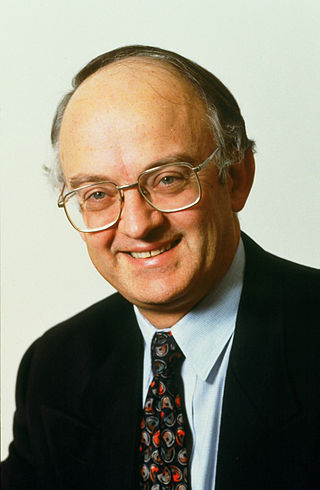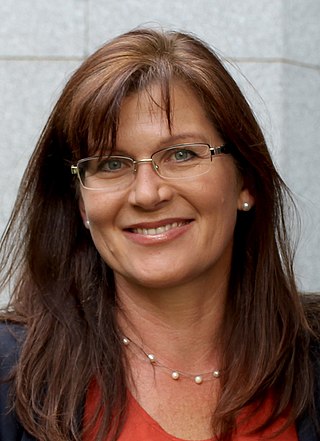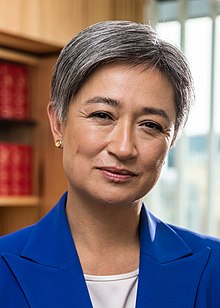
The Prime Minister of Australia is the head of government of the Commonwealth of Australia. The prime minister heads the executive branch of the federal government of Australia and is also accountable to federal parliament under the principles of responsible government. The current prime minister is Anthony Albanese of the Australian Labor Party, who became prime minister on 23 May 2022.

Robert Francis McMullan is an Australian former politician who represented the Australian Labor Party in both the Senate and the House of Representatives. He was the first person to represent the Australian Capital Territory in both houses of federal parliament

Kate Alexandra Lundy is a former Labor Party member of the Australian Senate, representing the Australian Capital Territory. Lundy served as the Minister for Multicultural Affairs and the Minister Assisting for the Digital Economy in the Second Rudd Ministry; having previously served as the Minister for Sport and the Minister Assisting the Minister for Industry and Innovation.
The Cabinet of Australia is the chief decision-making organ of the executive branch of the government of Australia. It is a council of senior government ministers, ultimately responsible to the Federal Parliament.

Kim John Carr is an Australian former politician who served as a Senator for Victoria between 1993 and 2022. Representing the Labor Party, he was a minister in the Rudd and Gillard Governments.

In Australia's political system, the Federal Executive Council is a body established by Section 62 of the Australian Constitution to advise the Governor-General, and comprises, at least notionally, all current and former Commonwealth ministers and assistant ministers. As the Governor-General is bound by convention to follow the advice of the Executive Council on almost all occasions, the Executive Council has de jure executive power. In practice, this power is used to legally enact the decisions already made by Cabinet, which according to the practices of the Westminster system has no de jure authority in its own right.

The Australian Government, also known as the Commonwealth Government, is the national government of Australia, a federal parliamentary constitutional monarchy. Like other Westminster-style systems of government, the Australian Government is made up of three branches: the executive, the legislative, and the judicial.

Katherine Ruth Gallagher is an Australian politician who has been serving as the Minister for Finance, Minister for Women, Minister for the Public Service and Vice-President of the Executive Council in the Albanese Government since 2022, and formerly served as the 6th Chief Minister of the Australian Capital Territory from 2011 to 2014. She has been a Senator for the Australian Capital Territory since the 2019 federal election, as a member of the Australian Labor Party (ALP). She previously served in the Senate from 2015 to 2018.

Dame Margaret Georgina Constance Guilfoyle was an Australian politician who served as a senator for Victoria from 1971 to 1987, representing the Liberal Party. She was the first woman to hold a cabinet-level ministerial portfolio in Australia and served as a minister for the duration of the Fraser Government. Guilfoyle was successively Minister for Education (1975), Minister for Social Security (1975–1980) and Minister for Finance (1980–1983). She worked as an accountant before entering politics and in retirement held various positions in the public and non-profit sectors.

Nigel Gregory Scullion is a former Australian politician who was a Senator for the Northern Territory from 2001 to 2019. He was a member of the Country Liberal Party (CLP) and sat with the National Party in federal parliament. He held ministerial office under four prime ministers.

Simon John Birmingham is an Australian politician who has been a Senator for South Australia since 2007. A member of the Liberal Party, he served in the Morrison Government as Minister for Finance from 2020 to 2022 and as Minister for Trade, Tourism and Investment from 2018 to 2020. He previously served as Minister for Education and Training in the Turnbull government from 2015 to 2018, and as a parliamentary secretary and assistant minister in the Abbott government.
Donald James Grimes was an Australian politician who served as a Senator for Tasmania from 1974 to 1987, representing the Australian Labor Party (ALP). In the Hawke Government he held ministerial office as Minister for Social Security (1983–1984) and Minister for Community Services (1984–1987). He was a general practitioner before entering politics.

Sir William Henry Spooner, was an Australian politician who served as a Senator for New South Wales from 1950 to 1965, representing the Liberal Party. He was a senior minister in the Menzies government, serving as Minister for Social Services from 1949 to 1951 and then Minister for National Development from 1951 to 1964. He was Leader of the Government in the Senate from 1958 to 1964.
In the Government of Australia, the Minister for Defence Personnel is a position which is currently held by Matt Keogh, after the Albanese ministry was sworn in on 1 June 2022, following the 2022 Australian federal election.

The Second Gillard ministry (Labor) was the 66th ministry of the Australian Government, led by Prime Minister Julia Gillard. It succeeded the first Gillard ministry upon its swearing in by Governor-General Quentin Bryce on 14 September 2010 after the 2010 election.
The Leader of the Opposition in the Senate is a party office held by the Opposition's most senior member of the Shadow Cabinet in the Australian Senate, elected to lead the opposition party in the body. Though the leader in the Senate does not have the power of the office of Leader of the Opposition, there are some parallels between the latter's status in the lower house and the former's in the Senate. In addition to his or her own shadow ministerial portfolio, the leader has overarching responsibility for all policy areas and acts as the opposition's principal spokesperson in the upper house. The leader is entitled to sit at the table of the Senate, and has priority in gaining recognition from the President of the Senate to speak in debate. Another similarity is that the leader typically announces changes to opposition officeholders in the Senate, including shadow ministers, party leadership and whips. The leader also has some responsibility for appointing opposition senators to committees, a role filled by the Manager of Opposition Business and whips in the lower house. The current leader is Simon Birmingham. He is assisted by a Deputy Leader of the Opposition in the Senate, currently Michaelia Cash.

The Leader of the Liberal Party, also known as Leader of the Parliamentary Liberal Party, is the highest office within the Liberal Party of Australia and the Liberal–National Coalition. The position is currently, and has been since 30 May 2022, held by Peter Dutton, who represents the Division of Dickson in Queensland. Peter Dutton is the fifteenth leader of the Liberal Party. Dutton is also the first leader of the party to represent a Queensland electorate.

The Albanese ministry is the 73rd ministry of the Government of Australia. It is led by the country's 31st Prime Minister, Anthony Albanese. The Albanese ministry succeeded the second Morrison ministry, which resigned on 23 May 2022 following the federal election that took place on 21 May which saw Labor defeat Scott Morrison's Liberal–National Coalition.















